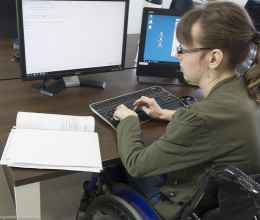
This post originally appeared as an op-ed in South Florida Sun-Sentinel.
Some 2.5 million Floridians know the feeling of walking into a United States immigration office with anticipation: the shiny halls, nerves running high and a mix of emotions in the air. Those who are there for the first time are hoping to have their right to live in this country recognized. Others are finalizing their journey, taking the last crucial step toward citizenship.
Those reading this who are not familiar with the process might be surprised to learn that becoming a naturalized citizen — aside from waiting several years and paying a hefty fee — requires first taking an oral, written, literacy and civics exam.
For me, this was the exam of a lifetime. My close friends knew how much I prepared for it. I carried around my study booklet and handmade flashcards everywhere, and even quizzed people who crossed my path on American government, history and geography. Unwittingly, these impromptu quizzes sparked many conversations with colleagues and friends on the meaning of American citizenship.
Finally becoming a citizen meant keeping my family together for good. To some, it means a shot at a dream job, serving this country or a greater guarantee of access to an American education. To others, a final promise of stability as well as safety from persecution for simply being who they are in the country where they happened, through no choice of their own, to be born.
In the U.S. last year, there were 834,000 newly naturalized citizens, yet, only half of eligible naturalized voters are registered to vote in the upcoming election. In Florida, where one in five residents are foreign-born, we had 95,975 newly naturalized citizens in 2018. Last year, 880,000 legal permanent residents in Florida were eligible to naturalize, but for one reason or another were unable to complete the citizenship process and register to vote.
As Florida’s immigrant community continues to grow, so should our impact at the ballot box. Becoming a citizen also meant becoming a voice for those in my community who cannot speak up, or fear speaking up. Walking into a voting booth for the first time was a foreign and exhilarating experience. It was a unique opportunity to affirm my values and be a voice for those like my mother who are still on a path to citizenship but not yet able to cast a vote in this country. It was also an opportunity to reaffirm my belief in the potential of this country, despite the atrocities happening around us.
As a new citizen, I feel a responsibility to also speak for the 10-12 million people who live among us and are still holding on for a chance to feel like they fully belong, and are valued for the contributions they are already making to our country. I feel a duty to be a voice for the many people whose citizenship process was unfairly delayed these past three years and whose eligibility to vote will not be granted in this crucial election.
By choosing to vote, you are expressing the values that matter to you and are taking charge of how policies will affect you and your community. Locally, your elected officials will make decisions that affect access to transportation, the quality of education, the distribution of local funds and how we police Black and brown communities. Nationally, our elected officials have the power to decide on our country’s COVID-19 response, the strength and direction of our economy, immigration policies like the detention and separation of children and families, access to quality healthcare and the equitable treatment and inclusion of historically marginalized communities. These issues affect us all, and the choices citizens like you make will impact our daily lives.
I challenge you, my fellow new citizens, to register to vote, and get out and vote as early as possible. Advocate for what you believe is best for you and your community and give a voice to your family, your friends and your coworkers, who are still dreaming of one day becoming citizens. You have the power to make a difference. Our democracy depends on it.
The deadline to register to vote is Oct. 5. Visit registertovoteflorida.gov.


